The Chief Information Officer (CIO) is a key player in shaping the strategic use of technology in an organization. This role involves overseeing the IT department, aligning technology-related decisions with the organization's goals, and ensuring the security and sustainability of IT systems.
Skills required for a CIO include a deep understanding of information technology and its applications, strategic thinking, leadership, and strong communication abilities. Assessing these skills involves evaluating both technical knowledge and leadership experiences.
Candidates can write these abilities in their resumes, but you can’t verify them without on-the-job Chief Information Officer skill tests.
In this post, we will explore 9 essential Chief Information Officer skills, 11 secondary skills and how to assess them so you can make informed hiring decisions.
Table of contents
9 fundamental Chief Information Officer skills and traits
The best skills for Chief Information Officers include Strategic Planning, Cybersecurity Management, IT Governance, Budgeting and Cost Control, Vendor Management, Data Analytics, Cloud Computing, Project Management and Change Management.
Let’s dive into the details by examining the 9 essential skills of a Chief Information Officer.
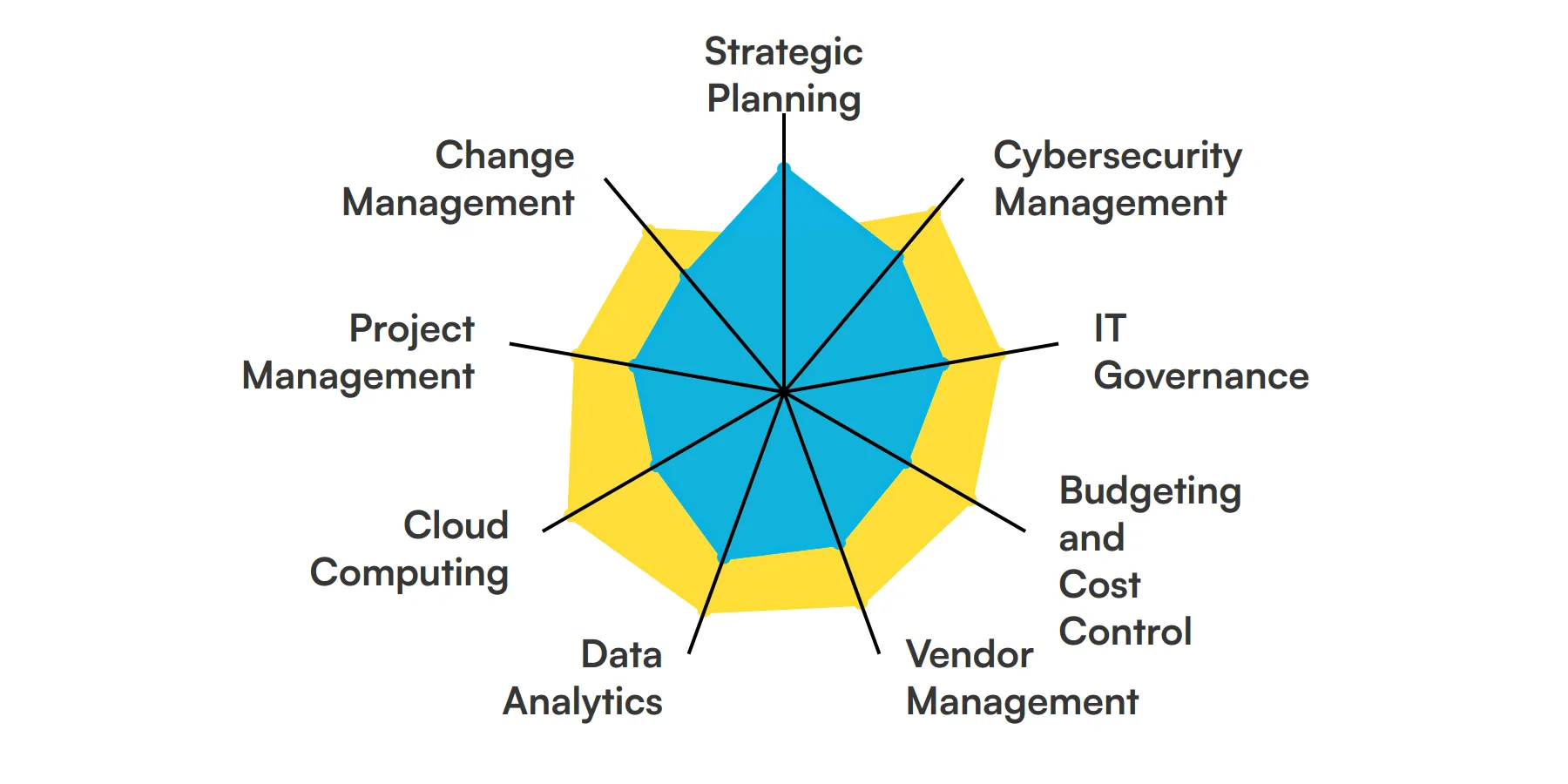
Strategic Planning
A Chief Information Officer (CIO) must excel in strategic planning to align IT initiatives with the overall business goals. This involves long-term visioning and road-mapping to ensure technology investments drive business growth and innovation.
Cybersecurity Management
In today's digital age, cybersecurity management is paramount. A CIO needs to safeguard the organization's data and IT infrastructure from cyber threats, ensuring compliance with regulations and protecting sensitive information.
For more insights, check out our guide to writing a Cyber Security Analyst Job Description.
IT Governance
IT governance involves establishing frameworks and policies to ensure IT resources are used effectively and align with business objectives. The CIO oversees this to maintain accountability and optimize IT performance.
Budgeting and Cost Control
Managing the IT budget is a critical skill for a CIO. This includes allocating resources wisely, controlling costs, and ensuring that IT investments deliver value to the organization.
Vendor Management
A CIO must adeptly handle vendor relationships to procure the best technology solutions and services. This involves negotiating contracts, managing performance, and ensuring vendors meet the organization's needs.
Data Analytics
Data analytics is essential for making informed decisions. A CIO leverages data to gain insights, drive business intelligence, and support strategic initiatives, ensuring the organization remains competitive.
Check out our guide for a comprehensive list of interview questions.
Cloud Computing
With the shift towards cloud-based solutions, a CIO must understand cloud computing to manage and integrate these services effectively. This includes overseeing cloud strategy, migration, and security.
Project Management
Effective project management ensures IT projects are completed on time and within budget. A CIO must oversee project portfolios, manage risks, and ensure alignment with business goals.
For more insights, check out our guide to writing a Project Manager Job Description.
Change Management
Change management is crucial for implementing new technologies and processes. A CIO must guide the organization through transitions, ensuring minimal disruption and maximum adoption.
11 secondary Chief Information Officer skills and traits
The best skills for Chief Information Officers include Enterprise Architecture, Compliance and Risk Management, Disaster Recovery Planning, Emerging Technologies, IT Service Management, Network Infrastructure, Software Development Lifecycle, User Experience (UX), Mobile Technologies, DevOps Practices and Artificial Intelligence (AI).
Let’s dive into the details by examining the 11 secondary skills of a Chief Information Officer.
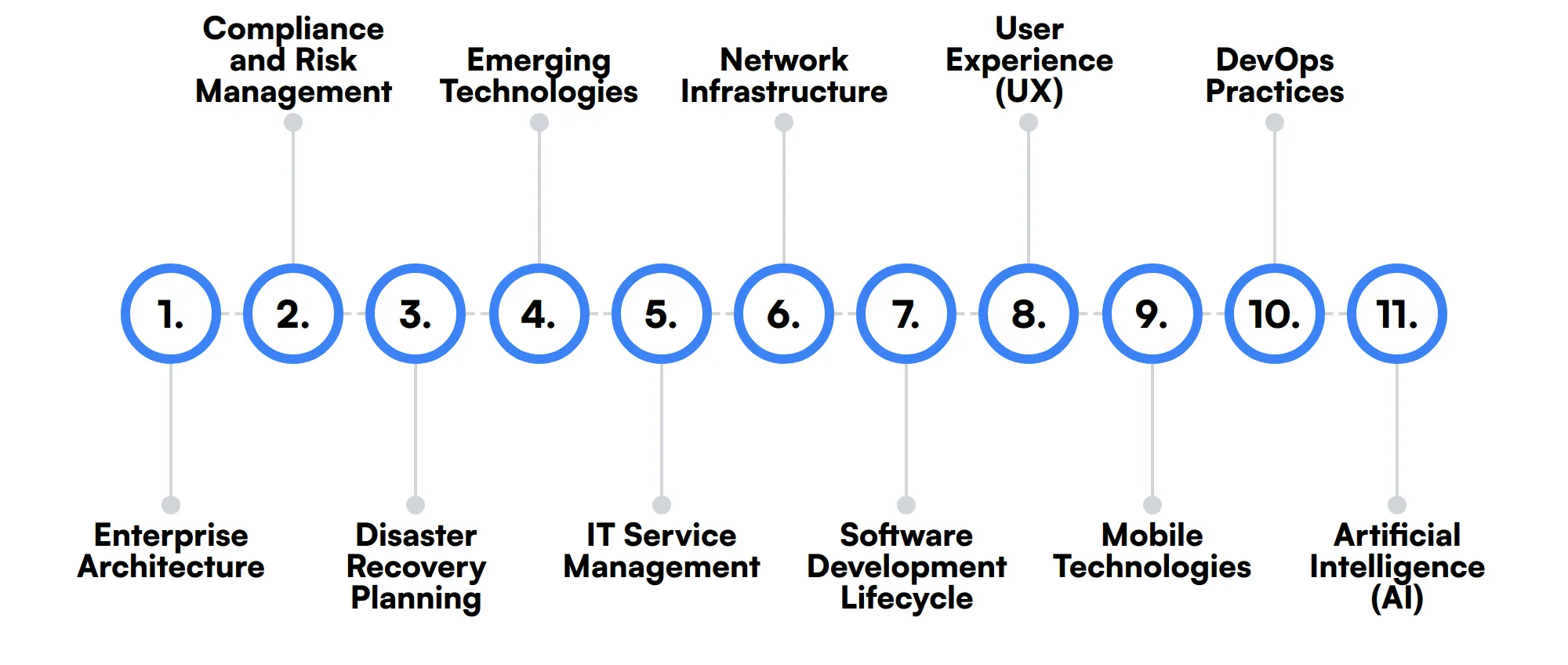
Enterprise Architecture
Understanding enterprise architecture helps a CIO design and implement IT systems that support business processes and strategies, ensuring scalability and efficiency.
Compliance and Risk Management
A CIO must ensure that IT practices comply with legal and regulatory requirements, managing risks to protect the organization from potential liabilities.
Disaster Recovery Planning
Preparing for IT disruptions is essential. A CIO develops and maintains disaster recovery plans to ensure business continuity in the event of a system failure or cyber attack.
Emerging Technologies
Staying abreast of emerging technologies allows a CIO to identify opportunities for innovation and keep the organization competitive in a rapidly evolving tech landscape.
IT Service Management
IT service management involves delivering and supporting IT services that meet the needs of the business. A CIO ensures these services are reliable, efficient, and aligned with business objectives.
Network Infrastructure
A solid understanding of network infrastructure is necessary for a CIO to oversee the design, implementation, and maintenance of the organization's network systems.
Software Development Lifecycle
Knowledge of the software development lifecycle helps a CIO manage and oversee software projects, ensuring they meet business requirements and are delivered on time.
User Experience (UX)
Focusing on user experience ensures that IT solutions are user-friendly and meet the needs of end-users, enhancing productivity and satisfaction.
Mobile Technologies
With the rise of mobile devices, a CIO must understand mobile technologies to support mobile strategies and ensure secure, efficient mobile access to business resources.
DevOps Practices
Implementing DevOps practices can streamline software development and operations. A CIO leverages these practices to improve collaboration, speed, and quality in IT projects.
Artificial Intelligence (AI)
AI can drive significant business value. A CIO explores AI applications to automate processes, enhance decision-making, and create innovative solutions.
How to assess Chief Information Officer skills and traits
Assessing the skills and traits of a Chief Information Officer (CIO) is a nuanced process that goes beyond reviewing resumes and conducting interviews. The role of a CIO involves a dynamic blend of technical expertise and strategic leadership, making it essential to evaluate both hard and soft skills effectively.
To accurately gauge a CIO's capabilities in areas like Strategic Planning, Cybersecurity Management, and IT Governance, organizations are increasingly turning to specialized assessment tools. These tools offer a more objective measure of a candidate's ability to handle the complexities of modern IT environments and align technology with business goals.
One effective way to streamline this assessment process is through Adaface assessments, which are designed to evaluate a range of competencies from Budgeting and Cost Control to Cloud Computing and Data Analytics. By utilizing these assessments, companies have reported an 85% reduction in screening time, ensuring that only the most qualified candidates move forward in the hiring process. Learn more about how Adaface can enhance your CIO recruitment strategy here.
Let’s look at how to assess Chief Information Officer skills with these 6 talent assessments.
Business Analyst Test
Our Business Analyst Test evaluates a candidate's ability to identify and define business problems, gather and analyze requirements, create process models and data flows, develop use cases, and communicate effectively with stakeholders.
The test covers data analysis, requirements gathering, data visualization, critical thinking, problem-solving, and SQL fundamentals. Candidates are assessed through scenario-based MCQs that test their ability to handle real-world business analysis tasks.
Successful candidates demonstrate strong skills in SQL CRUD statements, data interpretation, and business analysis, showcasing their ability to think critically and solve problems effectively.

Cyber Security Assessment Test
The Cyber Security Assessment Test evaluates a candidate's knowledge of cybersecurity basics, including operating systems, computer networks, and cloud concepts.
The test covers network security, cybersecurity attacks, cryptography, web security, email security, malware, data security, data governance, cybersecurity defenses, and risk assessments. Candidates are tested on their ability to detect security risks and set up guards against future cyber attacks.
High-scoring candidates show proficiency in penetration tests, risk assessments, and implementing cybersecurity defenses, demonstrating their ability to protect systems from various threats.
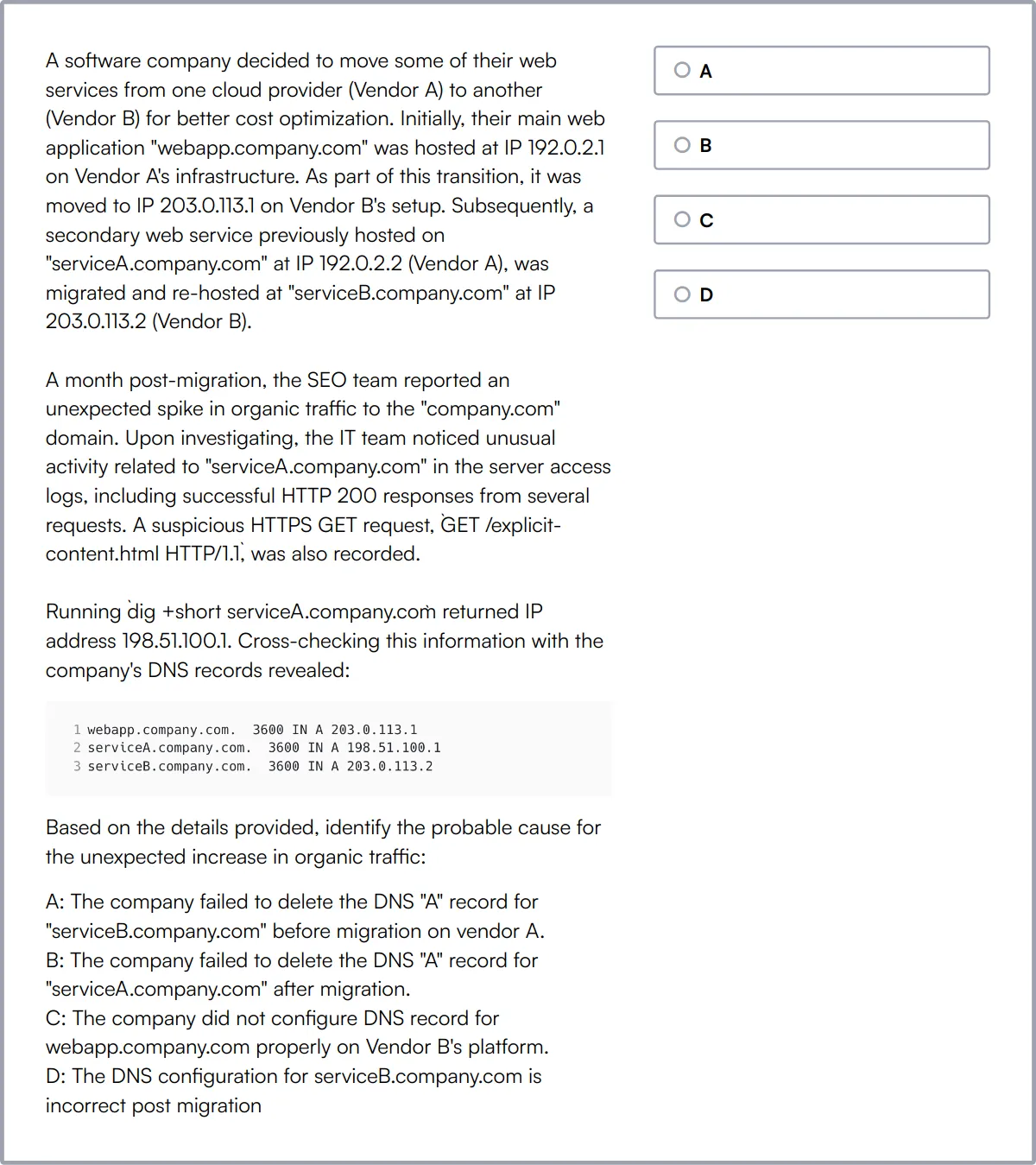
ITIL (Information Technology Infrastructure Library) Test
The ITIL Online Test evaluates a candidate's knowledge and understanding of ITIL principles and practices.
The test covers IT service continuity plans, service desk operations, release management processes, service capacity management, configuration management plans, problem management, capacity management, and IT financial management. Candidates are assessed through scenario-based multiple-choice questions.
Successful candidates demonstrate a strong understanding of ITIL terminology, concepts, and processes, and their ability to apply these principles to real-world scenarios.
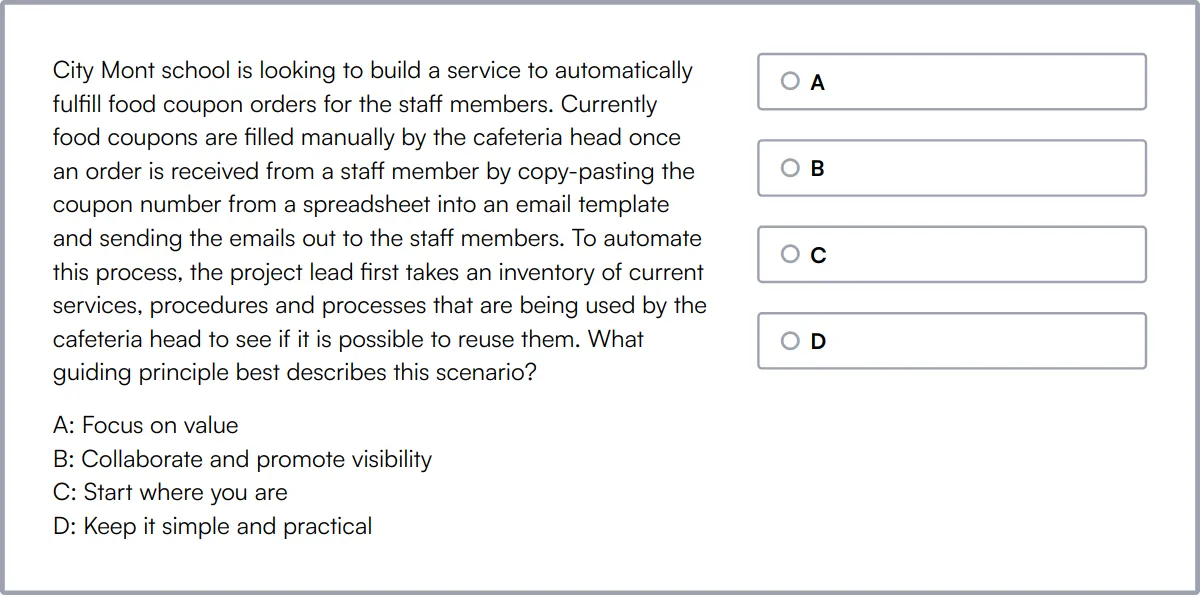
Financial & Excel Modeling Test
The Financial & Excel Modeling Test assesses a candidate's understanding of fundamental financial modeling concepts and their ability to create and maintain financial models using Excel.
The test covers financial analysis, financial planning, financial forecasting, financial reporting, valuation, investment analysis, risk management, budgeting, financial statements, cash flow statements, depreciation schedules, historical ratios, time value of money, net present value, internal rate of return, asset valuation, stock valuation, risk and return, rate of return, capital asset pricing model, Excel macros, and Excel modeling.
Candidates who excel in this test demonstrate strong skills in financial analysis and Excel modeling, showcasing their ability to handle complex financial data and create accurate financial models.
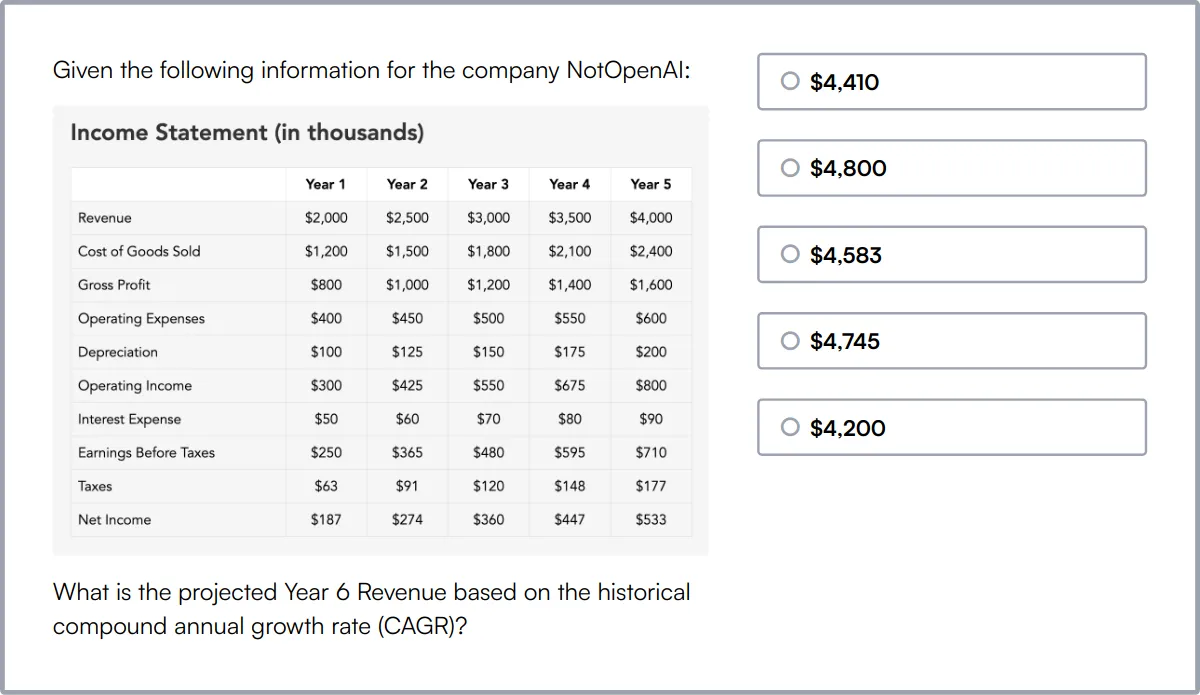
Data Analytics in Excel Test
The Data Analytics in Excel Test evaluates a candidate's ability to use Excel for data analysis and interpretation.
The test covers data interpretation, Excel functions, charts and graphs in Excel, data analysis fundamentals, and creating and sharing reports. Candidates are assessed through scenario-based multiple-choice questions.
Successful candidates demonstrate strong skills in data manipulation, functions, formulas, and data visualization using Excel, showcasing their ability to analyze and interpret data effectively.
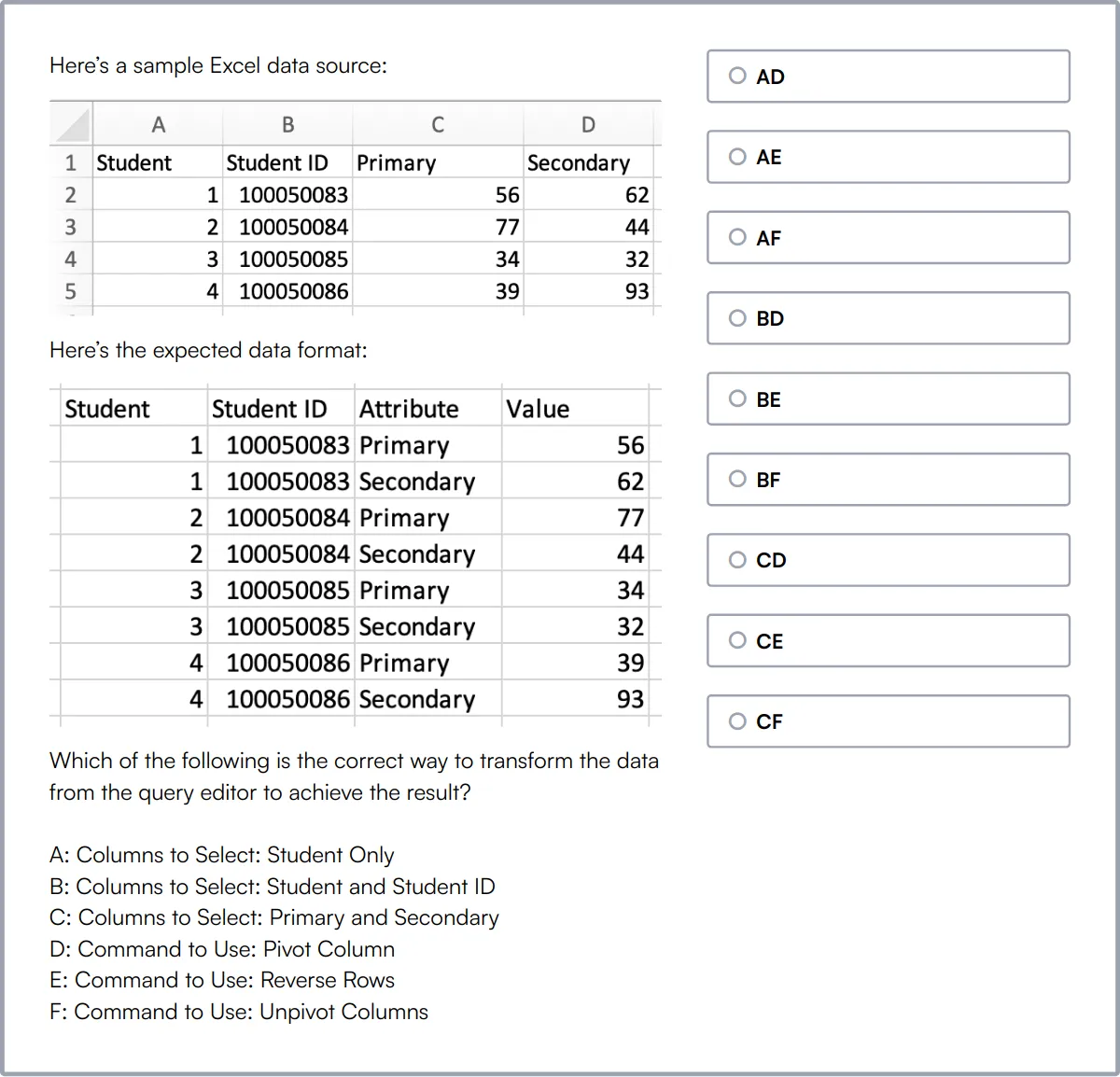
Cloud Computing Online Test
The Cloud Computing Online Test evaluates a candidate's knowledge and understanding of various aspects of cloud computing.
The test covers cloud service models, cloud deployment models, virtualization in cloud computing, cloud computing providers, cloud security, scalability and elasticity in cloud computing, cloud storage and database management, cloud networking, and cloud orchestration and automation.
Candidates who excel in this test demonstrate strong skills in cloud security, scalability, and database management, showcasing their ability to manage and optimize cloud environments effectively.
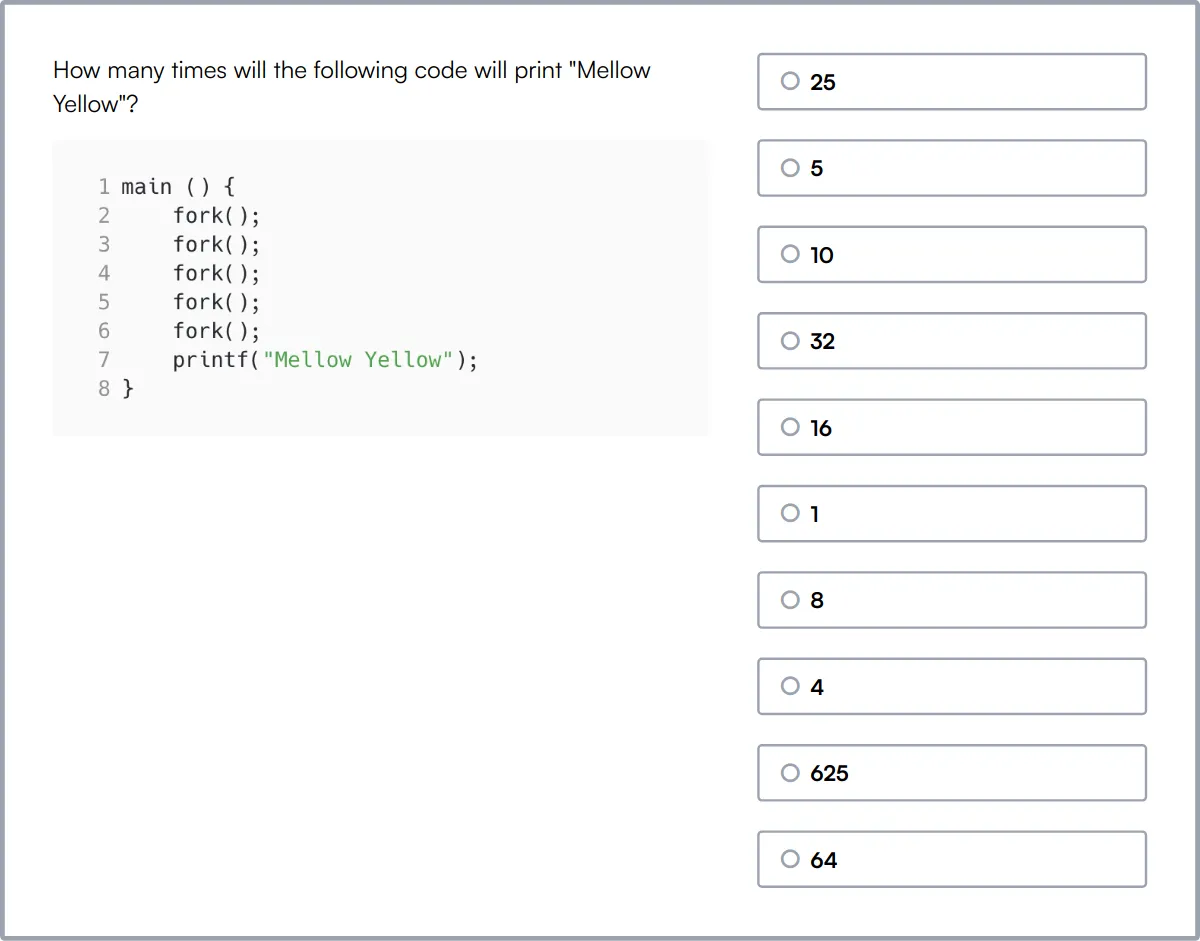
Summary: The 9 key Chief Information Officer skills and how to test for them
| Chief Information Officer skill | How to assess them |
|---|---|
| 1. Strategic Planning | Evaluate the ability to align IT strategy with business goals. |
| 2. Cybersecurity Management | Assess the capability to protect and secure organizational data. |
| 3. IT Governance | Check the proficiency in establishing IT policies and compliance frameworks. |
| 4. Budgeting and Cost Control | Measure the skill in managing IT budgets and controlling costs. |
| 5. Vendor Management | Determine the effectiveness in negotiating and managing vendor relationships. |
| 6. Data Analytics | Gauge the ability to interpret and leverage data for decision-making. |
| 7. Cloud Computing | Assess the expertise in deploying and managing cloud services. |
| 8. Project Management | Evaluate the capability to lead and deliver IT projects on time. |
| 9. Change Management | Check the proficiency in guiding organizations through IT changes. |
Cyber Security Assessment Test
Chief Information Officer skills FAQs
What are the key strategic planning skills needed for a Chief Information Officer?
A Chief Information Officer (CIO) should be adept at aligning IT strategies with business objectives, forecasting IT trends, and planning for long-term IT needs.
How important is cybersecurity management for a CIO?
Cybersecurity management is critical for a CIO to protect organizational data and infrastructure from threats, ensure compliance with regulations, and manage risk effectively.
What should a CIO know about IT governance?
A CIO needs to understand IT governance frameworks, policies, and procedures to ensure IT aligns with organizational goals and delivers value while managing risks.
How does a CIO manage IT budgeting and cost control?
Effective budgeting and cost control involve forecasting IT expenditures, optimizing costs, and ensuring investments in IT deliver adequate returns.
What role does vendor management play in a CIO's responsibilities?
Vendor management is key for a CIO to negotiate contracts, manage supplier relationships, and ensure third-party services meet company standards and needs.
Why is knowledge of cloud computing important for a CIO?
Cloud computing knowledge is necessary for a CIO to oversee the migration to the cloud, manage cloud services, and optimize cloud infrastructure for scalability and security.
How can a CIO use data analytics to improve organizational performance?
Data analytics enable a CIO to make data-driven decisions, identify trends, improve operational efficiency, and drive innovation within the organization.
What is the significance of project management skills for a CIO?
Project management skills help a CIO to oversee IT projects, ensure they are completed on time and within budget, and meet the strategic goals of the organization.
Assess and hire the best Chief Information Officers with Adaface
Assessing and finding the best Chief Information Officer is quick and easy when you use talent assessments. You can check out our product tour, sign up for our free plan to see talent assessments in action or view the demo here:

40 min skill tests.
No trick questions.
Accurate shortlisting.
We make it easy for you to find the best candidates in your pipeline with a 40 min skills test.
Try for freeRelated posts
Free resources



